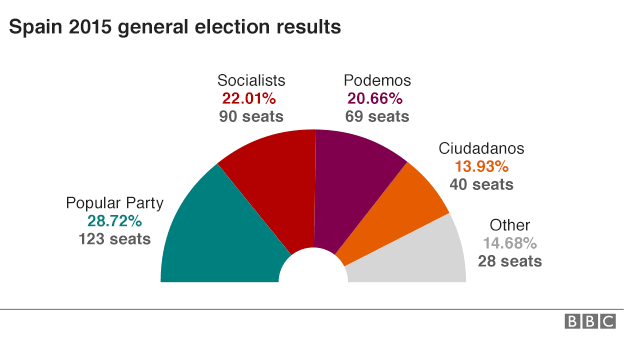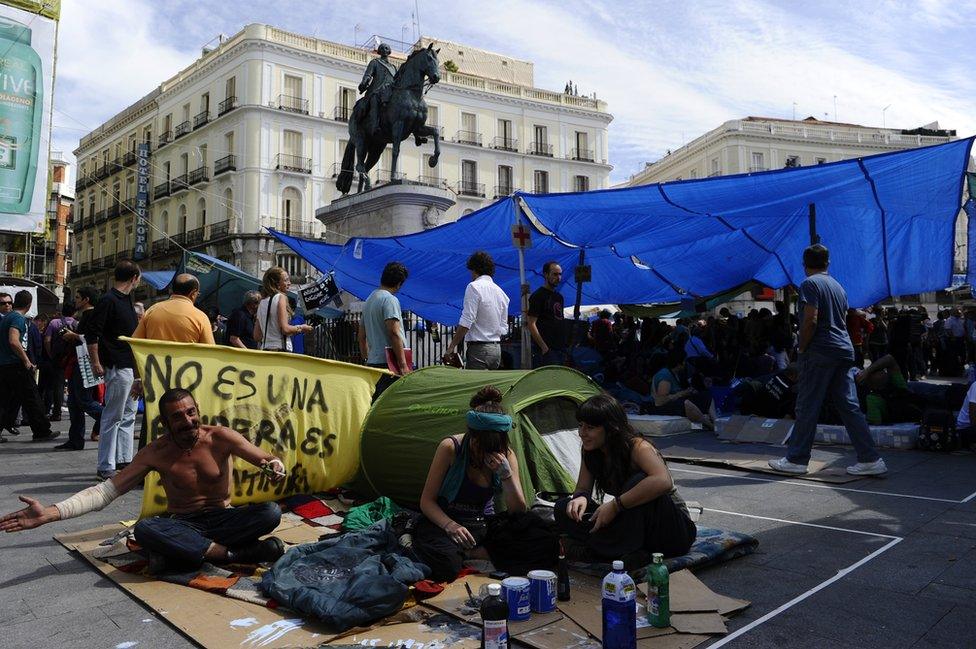Podemos: Spain anti-austerity party banging on doors of power
- Published

Pablo Iglesias was a lecturer in political science at the Complutense University of Madrid
Less than two years after it was founded, anti-austerity party Podemos (We Can) has come third in Spain's general election.
The result saw the ruling conservative Popular Party (PP) lose its majority, and puts Podemos in a strong position for forthcoming efforts to form a new coalition government.
Although not as strong as some supporters hoped, the vote is a big boost for a party born from the anti-austerity protest movement during Spain's economic crisis.
Podemos' ponytailed leader, Pablo Iglesias, hailed the birth of "a new Spain" and the death of decades of two-party politics.

Mr Iglesias formed Podemos in January 2014 with a group of fellow leftist university lecturers.
The party grew from Los Indignados, a grassroots protest movement calling for radical change amid soaring unemployment and cuts to public services.
The movement began in 2011 with thousands of mainly young Spaniards camping out in Madrid's central square, Puerta del Sol. It went on to inspire "Occupy" sit-ins in cities including London and New York.

Protesters gathered at the Puerta del Sol square in Madrid to demonstrate against Spain's economic crisis and jobless rate
Podemos pitches itself as an alternative to the spending cuts and corruption scandals that have enraged many in Spain.
It has called for evictions of homeowners to be stopped and welfare guaranteed for families hit by Spain's unemployment rate, which hit a record 26% in 2012.
It wants to open up government, calling for major governmental decisions to be put to referendums.
"We didn't set up Podemos to become like the PSOE [Socialists] or PP - historical parties for our children and grandchildren to join as heirs of the founders," says the party's chief political analyst, Carolina Bescansa, a university lecturer.
"Our idea was to create a tool to allow people to join a participative process."
Put to the test
Only four months after it was founded, Podemos won 8% of the vote in the May 2014 European elections, taking five seats in the European Parliament.
It surged ahead in opinion polls, with it uncompromising messages against austerity and corruption.
After the radical left Syriza party took power in Greece in January 2015, Mr Iglesias said a "wind of change" was starting to blow through Europe.

Pablo Iglesias has hoped to follow the success of his friend and ally, Syriza leader Alexis Tsipras (right)
Podemos argues Spain's economic crisis was a swindle on the part of the country's financial and political elite, and has vowed to renegotiate the country's debt with its international creditors in the same way Syriza promised to do.
Both left-wing and right-wing media have criticised Podemos, accusing it of having ties with Venezuela's left-wing leaders and alleging financial misconduct by some of its senior members.
The party's leaders have denied wrongdoing and promised to publish their tax returns.
Meanwhile some observers have questioned whether Podemos can maintain its initial growth as its political will is put to the test.
Although Spain has now officially come out of recession, the economy remains a key concern for voters.
It is still grappling with unemployment rates of 21% and youth unemployment of nearly 50%.